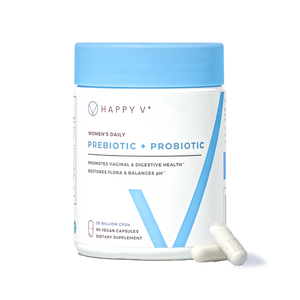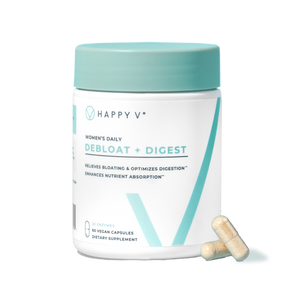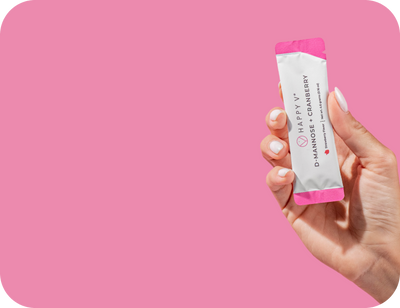- Fact Checked
- August 27, 2025
- 7 min read
The Best and Worst Foods For Vaginal Health
Table of Contents
Table of Contents
Have you ever heard the saying, “You are what you eat?” It turns out that it has a lot of merit. Eating healthy, whole foods supports your overall health, especially when it comes to your weight, your skin, your heart, and the health of your microbiomes—including your vaginal microbiome1.
“Modifying your diet can go a long way in boosting your natural defenses against recurrent infections. Especially if you struggle with gynecological infections like bacterial vaginosis (BV), yeast infections, or urinary tract infections (UTIs). ” - Dr. Barry Peskin
This post is for informational purposes only and does not constitute medical advice. See full disclaimer below.
How Does Diet Impact Vaginal Health?
When we eat, we aren’t just feeding ourselves; we are also feeding the trillions of microorganisms that live within our body and help it perform its daily processes.
In the vagina, one important microorganism is a beneficial bacteria called Lactobacillus. Lactobacilli release lactic acid, which helps maintain an optimal vaginal pH of between 3.8 and 4.52. This pH range supports a vaginal environment where healthy bacteria thrive and may help inhibit the growth of harmful bacteria associated with infections.
The foods you eat may influence how Lactobacillus colonizes your microbiome3. Certain foods, like yogurt, may help Lactobacilli thrive, while others, like alcohol, might support the growth of bacteria linked to infections4.
The Best Foods for Vaginal Health
According to Dr. Peskin, adding these foods to your diet (or increasing your intake) may help support vaginal comfort and overall vaginal health.
Probiotic-Rich, Fermented Foods
Probiotics are, simply put, good bacteria. That Lactobacillus bacteria we mentioned earlier that helps maintain vaginal pH? It’s a probiotic with benefits for vaginal health, including helping to balance estrogen levels, which may minimize or prevent some PMS symptoms.
Increasing your intake of probiotic-rich, fermented foods like Greek yogurt, kefir, miso, kombucha, and kimchi may increase the amount of probiotics in your gut and vagina, supporting vaginal health5.
Here’s a simple recipe for a probiotic-rich smoothie:
- 1/2 cup kefir
- 1/2 cup mixed berries
- 2 leaves of kale
- 1 tablespoon coconut oil
- 1/2 serving (approx. 15g) whey protein isolate
Just be careful not to add too many probiotic-rich foods into your diet too quickly, as this can cause side effects like diarrhea6. Add probiotics gradually to allow your body to adjust.
Water
“Drink more water” may not be the most original health advice, but it’s good advice nonetheless! Staying hydrated supports many aspects of health, including brain function, gut health, and physical performance. For vaginal health, drinking enough water helps keep vaginal walls lubricated and supports flushing of bacteria from the urinary tract7.
Benefits of drinking water include:
- Lubricating vaginal walls, which may reduce vaginal itching and discomfort during sex.
- Helping maintain a balanced vaginal pH.
- Supporting the flushing of bacteria that can contribute to yeast infections, BV, and UTIs.
If you’ve tried increasing your water intake before and found it challenging, try this tip: as soon as you wake up, drink 2 cups of water. If you work out in the morning, drink 16 ounces of water for every hour of exercise. This can help you consume 4–5 glasses of water before your workday starts.
Cranberries
Cranberries contain antioxidants and phytonutrients that have been linked to reduced prevalence of UTIs8. However, many traditional cranberry juices may lack these nutrients because they are lost during processing.
To support urinary health, try incorporating fresh cranberries into your diet by adding them to plain yogurt or making homemade cranberry jam9.
Here’s a simple cranberry jam recipe:
- 1/2 cup fresh orange juice
- 1/2 cup water
- 1 bag fresh or frozen cranberries (not dried)
- Zest of one orange (about 2 teaspoons)
- Pinch of salt
Avocados
Avocados are rich in healthy fats, potassium, and vitamin B-6, which may support vaginal lubrication and estrogen levels. Just a quarter of a normal-sized avocado provides these benefits!
Enjoy avocados on toast, tacos, or as guacamole. With avocados, it’s hard to go wrong.
Root Vegetables
Root vegetables like sweet potatoes, beets, carrots, parsnips, and yucca are nutrient-dense and a great source of energy. They are also prebiotic, meaning they feed probiotics and may help support their growth.
Try this simple root vegetable dish:
- 1 cup yucca
- 1 teaspoon garlic
- 1 teaspoon olive oil
- Pinch of rock salt and cilantro
Garlic
Garlic offers many health benefits that may support vaginal health, such as:
- Helping reduce bacteria and yeast associated with infections.
- Improving blood flow, which may enhance vaginal and sexual health.
- Supporting relief from PMS symptoms like headaches, cramps, and inflammation.
Use garlic in cooking or supplements, but avoid inserting garlic directly into the vagina, as it can cause irritation.
Leafy Green Vegetables
Eating more dark leafy greens may support blood purification and circulation, which in turn can enhance vaginal lubrication and stimulation.
Whole Grains and Nuts
Whole grains, nuts, and seeds provide healthy fiber like prebiotics and vitamin E, which help keep skin and vaginal tissues hydrated and may support healthy bacterial balance10. Look for products labeled “100% whole grain” or “100% whole wheat.” Healthy fats from nuts, such as pumpkin seeds, almonds, walnuts, and flaxseeds, may also help nourish good bacteria.
Sardines and Salmon
Rich in vitamin D and omega-3 fatty acids, sardines and salmon may support brain, heart, and vaginal health11. Vitamin D deficiency is linked to hormonal imbalances, which can affect Lactobacillus levels and infection risk12.
These fish may also:
- Reduce inflammation and relieve cramps13.
- Support vaginal muscle tone.
- Help regulate mood swings and PMS symptoms.
- Support vaginal comfort during menopause.
The Worst Foods for Vaginal Health
While leafy greens, whole grains, and water are supportive of vaginal health14, other foods like alcohol, coffee, and processed foods may encourage the growth of harmful bacteria and increase infection risk.
Alcohol
Excessive drinking can cause vaginal dryness, disrupt estrogen levels, and may increase risk of bacterial vaginosis15. Moderate your alcohol intake to support vaginal health.
Asparagus
Asparagus is alkaline and may raise vaginal pH above the optimal range, potentially increasing susceptibility to infections.
Coffee
Coffee’s effects on vaginal health are mixed. It may help prevent some bacterial imbalances but can also cause dehydration, which may contribute to vaginal dryness and increased risk of infection. Drinking coffee in moderation, with adequate water, is advised.
Fried & Processed Foods
High in unhealthy fats and calories, fried and processed foods may disrupt vaginal pH and increase infection risk16.
Processed Sugar
Sugar can feed harmful bacteria and may upset the vaginal bacterial balance, increasing infection risk over time17.
Support A Healthy Diet With Happy V
Improving your diet is always a positive step. However, changes in diet alone may not be enough for everyone to maintain vaginal health.
One of our customers, Dory, shares her experience:
“I was eating healthfully. I was in the gym. I was drinking water. I was doing everything that I thought I should be doing. And it seemed like my body was still working against me. But I realized that there was nothing the doctor was giving me that was going to fix this. I found something natural that helped me more than any doctor had ever helped at all.” - Dory
Dory’s experience is her own and may not reflect typical results.
For those with a history of vaginal infections, high-quality supplements like Happy V® Prebiotic + Probiotic may support vaginal microbiome balance. Our Prebiotic + Probiotic contains clinically studied strains of Lactobacillus at effective doses to help support vaginal health, while our D-Mannose + Cranberry capsules may support urinary tract comfort.
Disclaimer: The information in this article is for educational purposes only and is not a substitute for professional medical advice. These statements have not been evaluated by the Food and Drug Administration. This product is not intended to diagnose, treat, cure, or prevent any disease. Individual results may vary.












